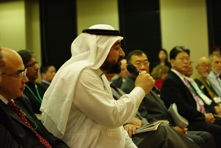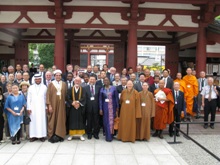Religious leaders remind G8 summit that the eco crisis is a crisis of the heart
1 July 2008:
 |
 |
 |
Sheikh Abdallah Alheedan, Assistant Deputy Minister, Islamic Affairs speaks at the G8 Religious Leaders Summit in Japan. |
The real environmental issue for our generation is the issue of the heart.
This was the conclusion of a major meeting of some 150 religious leaders, foreign delegates and scholars in Japan prior to the G8 Leaders Summit in Hokkaido later this month.
The G8 Religious Leaders Summit took place from 27-29 June in Osaka & Kyoto - and in its third incarnation since it first took place in 2006 it has now become recognised as one of the key assemblies in the inter-religious dialogue calendar.
The main theme of the Summit was ‘Living with the Earth: Message from World Religions’. According to ARC’s representative Michael Shackleton, who was an observer at the meeting, the word ‘with’ featured frequently in discussion because it was widely recognised by participants that answers to world problems will only come through appreciating how we are partners with each other, and with the rest of Creation.
We “commit our resources and mobilising power to the transition to a low-carbon society,” pledged the participants, who included Saudi Arabia’s Assistant Deputy Minister of Islam Sheikh Abdallah Allheedan, Prince Norodom Sirivudh, Privy Councillor to the King of Cambodia and Mongolia's Khambo Lama.
“We shall seek to qualify materialism and consumerism, control the overloading of desire to the point of the destruction of nature and reflect life’s brilliance by moving the hearts of our following to pray for the happiness and flourishing of others and the showing of mercy by the powerful,” states the three page proposal.
 |
| “I am a scientist and this is the first time I am discussing religious problems with religious leaders. I now realise that we must all share their sense of ‘something great’ if we are really going to successfully tackle the big problems facing us…The Japanese word ‘kokoro’, signifying both heart AND mind, captures an important essence of human nature that the English language seems to have lost.” Yoshinori Yasuda of the International Research Centre for Japanese Studies and a panel chairperson at the Religious G8 2008. |
|
 |
 |
“Recycling and other technologies have successfully tackled several problems but we feel the basic issue lies in the human heart. Religions have had centuries of experience with management of crises arising from the troubles of kokoro [which is the Japanese word for both the human heart and mind]. Behavioural change, a shift in expectations, these are effected from within the heart and are addressed by means of the scriptural and other traditions by which millions still live.
“Our G8 Religious Leaders’ Summit reached agreement that environmental problems cannot be seriously addressed without tackling the “heart issue”.
“From ancient times the Japanese people have believed in the existence of life in the mountains and rivers, trees and flowers, and have revered that life in their traditional culture, as a divine presence,” said Ven. Yukei Matsunaga, honorary president, G8 RLS 2008 - who is also the president of the Japan Buddhist Federation and the patriarch of Koyasan Shingon-shu.
“I feel that in turning our minds to religious traditions once again, we should be able to develop plans which surmount ethnic and religious differences and create an harmonious coexistence with all religious persuasions on earth.”
 |
 |
 |
ISE Shinto Shrine, Japan. |
Yoshinori Yasuda of the International Research Centre for Japanese Studies and a panel chairperson concurred: “I am a scientist and this is the first time I am discussing religious problems with religious leaders. I now realise that we must all share their sense of ‘something great’ if we are really going to successfully tackle the big problems facing us…The Japanese word ‘kokoro’, signifying both heart AND mind, captures an important essence of human nature that the English language seems to have lost.”
The main meetings took place in the conference facilities of Osaka University and Doshisha University, but panel meetings and other events were held in beautiful religious surroundings such as Kamigamo Shrine or Nishi Hongan-ji, in Kyoto, or the Izuo KonkoKyo shrine in Osaka. In addition, there were visits to the ancient Shitennoji Temple in Osaka, and the nearby Airin district, where the life of Japan’s day labourers stands in stark contrast with the wealth & comfort so often associated with Japan.
The other two areas, in addition to Living with Nature were Living with Ethnic Diversity and Reckoning with Africa’s Problem.
 |
 |
 |
Seven of the major faiths were represented at the G8 Religious Leaders Summit, including Buddhist, Islam, Shinto and Sikhism. |
The participants were welcomed by the Vice-Minister of the Japanese Foreign Office, the Governor of Osaka and the Mayor of Kyoto, with support organizations including the Japanese Ministry of the Environment, the Japan Committee of UNICEF, the National Federation of UNESCO Associations in Japan, the United Nations Association of Kansai, and the Kyoto Chamber of Commerce & Industry.
This degree of secular support testifies to the realisation at senior levels that most people in the world follow one of the major faiths, and that religious leaders frequently command more respect and support than political leaders.
The event was co-ordinated and arranged by Mitsuo and Yoshinobu Miyake, of the Konko Church of Izuo in Osaka. Seven of the major faiths were represented: Buddhism, Christianity (Protestant & Catholic) , Hinduism, Islam, Judaism, Shintoism (Sect & Shrine) and Sikhism. Japanese New Religions (eg. Konkokyou, Tenri-kyou), indigenous traditions and druidism were also represented.
LinksLink here for more details of the G8 Summit.
And here.
Link here for news on Buddhists commiting to the environment.
And here for details of a Muslim Theology of the Sea.
Link here for news of a multi-faith walk which took place in July 2008 across Clifton Suspension Bridge with a Jewish Rabbi, a Christian Bishop and a Muslim Imam.
|

